
-
Speakers and Discussants Martin J. Gruenberg has been the Acting Chairman of the FDIC Board of Directors since February 5, 2022. Since mid-2018, he has served as a member of the FDIC Board. Prior to that time, Mr. Gruenberg also served as Chairman of the FDIC, receiving Senate confirmation on November 15, 2012, for a five-year term. Mr. Gruenberg served as Vice Chairman and Member of the FDIC Board of Directors from August 2005, until his confirmation as Chairman. He served as Acting Chairman from July 2011 to November 2012, and also from November 2005 to June 2006.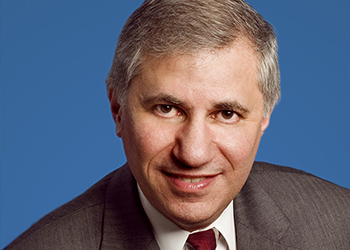
Mr. Gruenberg joined the FDIC Board after broad congressional experience in the financial services and regulatory areas. He served as Senior Counsel to Senator Paul S. Sarbanes (D-MD) on the staff of the Senate Committee on Banking, Housing, and Urban Affairs from 1993 to 2005. He also served as Staff Director of the Banking Committee's Subcommittee on International Finance and Monetary Policy from 1987 to 1992.
Mr. Gruenberg served as Chairman of the Executive Council and President of the International Association of Deposit Insurers (IADI) from November 2007 to November 2012.
In addition, Mr. Gruenberg served as Chairman of the Federal Financial Institutions Examination Council from April 2017 to June 2018. Since June 2019, Mr. Gruenberg has served as Chairman of the Board of Directors of the Neighborhood Reinvestment Corporation (NeighborWorks America), and he has been a member of the Board since April 2018.
Since June 2019, Mr. Gruenberg has served as Chairman of the Board of Directors of the Neighborhood Reinvestment Corporation (NeighborWorks America), and he has been a member of the Board since April 2018.
Mr. Gruenberg holds a J.D. from Case Western Reserve Law School and an A.B. from Princeton University, Woodrow Wilson School of Public and International Affairs.
John N. Friedman is the PDBF Distinguished Professor of Economics and International and Public Affairs at Brown University, as well as a founding co-Director of Opportunity Insights. His studies the causes and consequences of inequality for kids, as well as policies to improve opportunity for children from disadvantaged backgrounds. His work has appeared in top academic journals as well as in major media outlets, has been cited by President Obama in his 2012 State of the Union Address, and has shaped policies at the federal, state, and local level. Most recently, John and his colleagues at Opportunity Insights have published the Economic Tracker, providing the most granular and real-time look at how COVID-19 is affecting the economy in cities and states across America. He worked as Special Assistant to the President for Economic Policy at the National Economic Council in the White House. He is also a Research Associate at NBER and Co-Editor at the flagship journal in the profession, the American Economic Review. He currently serves as Chair of the Brown University Economics Department. Alexandru Barbu is a PhD candidate in Finance at London Business School. His research interests are in financial intermediation, insurance and household finance. In ongoing work, Alexandru looks at how financial intermediaries provide aggregate risk insurance to households. Alexandru holds a MSc in Economics from Barcelona Graduate School of Economics at Pompeu Fabra and a BSc in Economics from the Bucharest Academy of Economic Sciences. He was also a visiting PhD student at the University of Chicago Booth. Prior to joining London Business School, Alexandru worked in the Research Department at the Deutsche Bundesbank and the Monetary Policy Directorate at the European Central Bank.
Alexandru Barbu is a PhD candidate in Finance at London Business School. His research interests are in financial intermediation, insurance and household finance. In ongoing work, Alexandru looks at how financial intermediaries provide aggregate risk insurance to households. Alexandru holds a MSc in Economics from Barcelona Graduate School of Economics at Pompeu Fabra and a BSc in Economics from the Bucharest Academy of Economic Sciences. He was also a visiting PhD student at the University of Chicago Booth. Prior to joining London Business School, Alexandru worked in the Research Department at the Deutsche Bundesbank and the Monetary Policy Directorate at the European Central Bank.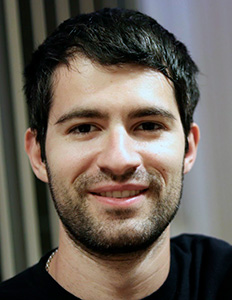 Matteo Benetton is an assistant professor in the Finance Group at Berkeley Haas. His work centers on the intersection between competition in the lending market, mortgage product design, financial innovation and regulation. Matteo's research has been awarded the CEPR Household Finance Best Student Paper Award in 2017, the EARIE Paul Geroski Prize for the most significant policy contribution in 2017, and the Arthur Warga Award for Best Paper in Fixed Income at SFS Cavalcade in 2021.
Matteo Benetton is an assistant professor in the Finance Group at Berkeley Haas. His work centers on the intersection between competition in the lending market, mortgage product design, financial innovation and regulation. Matteo's research has been awarded the CEPR Household Finance Best Student Paper Award in 2017, the EARIE Paul Geroski Prize for the most significant policy contribution in 2017, and the Arthur Warga Award for Best Paper in Fixed Income at SFS Cavalcade in 2021.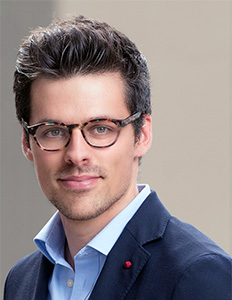 Vivek Bhattacharya is an Assistant Professor in the Department of Economics at Northwestern University. He studies industrial organization, with a focus on financial markets, auctions, and procurement. He received his PhD from MIT in 2017.
Vivek Bhattacharya is an Assistant Professor in the Department of Economics at Northwestern University. He studies industrial organization, with a focus on financial markets, auctions, and procurement. He received his PhD from MIT in 2017.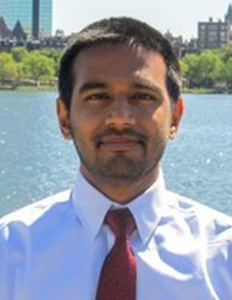
 Taha Choukhmane is an Assistant Professor of Finance at the MIT Sloan School of Management. He was a postdoctoral fellow at the National Bureau of Economic Research, and he received his PhD in economics at Yale University. His research interests lie at the intersection of household finance and behavioral economics, with a focus on households' saving decisions. His current research projects examine the long-term effect of automatic enrollment policies, the behavioral biases that affect investment and portfolio-allocation decisions, racial disparities in retirement wealth accumulation, and the extent to which married couples coordinate their saving decisions.
Taha Choukhmane is an Assistant Professor of Finance at the MIT Sloan School of Management. He was a postdoctoral fellow at the National Bureau of Economic Research, and he received his PhD in economics at Yale University. His research interests lie at the intersection of household finance and behavioral economics, with a focus on households' saving decisions. His current research projects examine the long-term effect of automatic enrollment policies, the behavioral biases that affect investment and portfolio-allocation decisions, racial disparities in retirement wealth accumulation, and the extent to which married couples coordinate their saving decisions.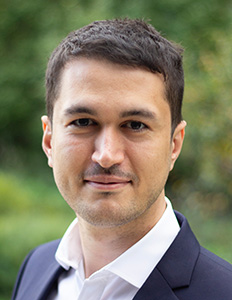 Benjamin Collier is an Assistant Professor in the Department of Risk, Actuarial Science, and Legal Studies in the Fox School of Business at Temple University. His research examines how households and firms manage severe climate risks. His recent projects analyze households' insurance contract decisions in the U.S. National Flood Insurance Program, the use of low-interest-rate federal disaster recovery loans by households and businesses, and the effects of Hurricane Harvey on the finances of small and medium businesses.
Benjamin Collier is an Assistant Professor in the Department of Risk, Actuarial Science, and Legal Studies in the Fox School of Business at Temple University. His research examines how households and firms manage severe climate risks. His recent projects analyze households' insurance contract decisions in the U.S. National Flood Insurance Program, the use of low-interest-rate federal disaster recovery loans by households and businesses, and the effects of Hurricane Harvey on the finances of small and medium businesses.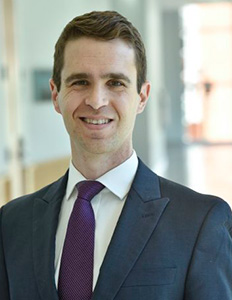 Emily Gallagher is an assistant professor of finance at the University of Colorado Boulder. She is also a research fellow at the Federal Reserve Banks of Philadelphia and St. Louis. Her work often involves quasi-experimental designs, using large policy changes or natural disasters as tools to better understand the financial calculus of households. She received her B.S. from the University of Michigan, her Ph.D. in economics from the Sorbonne, and her post-doctorate at Washington University in St. Louis.
Emily Gallagher is an assistant professor of finance at the University of Colorado Boulder. She is also a research fellow at the Federal Reserve Banks of Philadelphia and St. Louis. Her work often involves quasi-experimental designs, using large policy changes or natural disasters as tools to better understand the financial calculus of households. She received her B.S. from the University of Michigan, her Ph.D. in economics from the Sorbonne, and her post-doctorate at Washington University in St. Louis.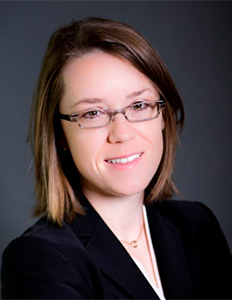 Dan Herbst is an assistant professor of economics at the University of Arizona specializing in labor, public finance, and higher education. He holds a PhD from Princeton University and a BA from Brown University. Most recently, Dan's research explores the optimal design of student loan contracts and market failures in human capital financing.
Dan Herbst is an assistant professor of economics at the University of Arizona specializing in labor, public finance, and higher education. He holds a PhD from Princeton University and a BA from Brown University. Most recently, Dan's research explores the optimal design of student loan contracts and market failures in human capital financing.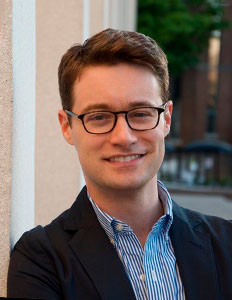 Tatiana Homonoff is an Associate Professor of Economics and Public Policy at NYU’s Robert F. Wagner School of Public Service.
Tatiana Homonoff is an Associate Professor of Economics and Public Policy at NYU’s Robert F. Wagner School of Public Service.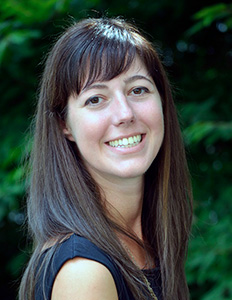
Her research focuses on identifying areas in which behavioral economics can improve public policy, primarily in the areas of tax policy, program participation, and consumer finance. Prior to joining NYU, she was an Assistant Professor in the Department of Policy Analysis and Management at Cornell University. She served as a Faculty Fellow at the White House Social and Behavioral Sciences Team (SBST) in 2016. She is a Faculty Research Fellow at the National Bureau of Economic Research.
Homonoff received a Bachelor's from Brown University and a Ph.D. in Economics from Princeton University.
Lauren Lambie-Hanson is a senior advisor and research fellow in the Consumer Finance Institute at the Federal Reserve Bank of Philadelphia. Her primary research interests include residential mortgage lending, housing affordability, and the maintenance and improvement decisions of property owners. Before joining the Consumer Finance Institute, she was a principal financial economist in the Philadelphia Fed's Supervision, Regulation, and Credit Department. Lauren holds a Ph.D. in urban and regional studies from the Massachusetts Institute of Technology and a master's degree in public policy from the University of California, Berkeley. Lara Loewenstein is a research economist at the Federal Reserve Bank of Cleveland whose research focuses on commercial and residential real estate. Dr. Loewenstein earned her BS in mathematics from the University of California, Los Angeles, and her MS and PhD in international economics and finance from Brandeis University.
Lara Loewenstein is a research economist at the Federal Reserve Bank of Cleveland whose research focuses on commercial and residential real estate. Dr. Loewenstein earned her BS in mathematics from the University of California, Los Angeles, and her MS and PhD in international economics and finance from Brandeis University. David Low is an economist at the Consumer Financial Protection Bureau. His research uses both theory and evidence to study major issues in consumer finance, such as the effects of auto dealer loan intermediation and why mortgage borrowers default on their loans. He received his Ph.D. in Economics from NYU in 2015.
David Low is an economist at the Consumer Financial Protection Bureau. His research uses both theory and evidence to study major issues in consumer finance, such as the effects of auto dealer loan intermediation and why mortgage borrowers default on their loans. He received his Ph.D. in Economics from NYU in 2015. Paolina C. Medina is an Assistant Professor of Finance at the Mays Business School of Texas A&M University. She conducts research on Household Finance using field experiments and observational data, with a focus on understanding how psychological biases in consumer behavior affect outcomes in financial markets. Her research has been published in the Review of Financial Studies and Management Science. She received her PhD in Managerial Economics from Northwestern University in June 2017, and her BA in Economics from ITAM in 2009. In between, Professor Medina worked at the Central Bank of Mexico with the group in charge of regulation of retail financial services.
Paolina C. Medina is an Assistant Professor of Finance at the Mays Business School of Texas A&M University. She conducts research on Household Finance using field experiments and observational data, with a focus on understanding how psychological biases in consumer behavior affect outcomes in financial markets. Her research has been published in the Review of Financial Studies and Management Science. She received her PhD in Managerial Economics from Northwestern University in June 2017, and her BA in Economics from ITAM in 2009. In between, Professor Medina worked at the Central Bank of Mexico with the group in charge of regulation of retail financial services. Dimuthu Ratnadiwakara is an Assistant Professor of Finance at the E. J. Ourso College of Business at Louisiana State University. His primary area of research is household finance, real estate, and fintech. Before joining LSU, he completed a doctorate in finance at the C.T. Bauer College of Business at the University of Houston
Dimuthu Ratnadiwakara is an Assistant Professor of Finance at the E. J. Ourso College of Business at Louisiana State University. His primary area of research is household finance, real estate, and fintech. Before joining LSU, he completed a doctorate in finance at the C.T. Bauer College of Business at the University of Houston Alexander Zentefis is Assistant Professor of Finance at the Yale School of Management. He does research in banking, corporate culture, industrial organization, and asset pricing. His recent research shows how large pay inequality can drive corporate cultures to progress after societal change. He earned bachelor's and master's degrees from Washington University in St. Louis and a PhD from The University of Chicago.
Alexander Zentefis is Assistant Professor of Finance at the Yale School of Management. He does research in banking, corporate culture, industrial organization, and asset pricing. His recent research shows how large pay inequality can drive corporate cultures to progress after societal change. He earned bachelor's and master's degrees from Washington University in St. Louis and a PhD from The University of Chicago. Kamila Sommer is the section chief of the Consumer Finance section at the Federal Reserve Board, where she also worked as an economist in the Real Estate Finance and Flow of Funds sections for a number of years. She earned her PHD from Georgetown University in 2010. Her research specializes in housing and credit markets, and household wealth inequality.
Kamila Sommer is the section chief of the Consumer Finance section at the Federal Reserve Board, where she also worked as an economist in the Real Estate Finance and Flow of Funds sections for a number of years. She earned her PHD from Georgetown University in 2010. Her research specializes in housing and credit markets, and household wealth inequality. Jeff Traczynski is a Financial Economist in the Center for Financial Research at the FDIC. He received his PhD from the University of Wisconsin. His research interests include law and economics, personal and corporate default, and small business lending.
Jeff Traczynski is a Financial Economist in the Center for Financial Research at the FDIC. He received his PhD from the University of Wisconsin. His research interests include law and economics, personal and corporate default, and small business lending. Michael Reher's research is at the intersection of intermediary finance and household finance, with a common theme of how the supply of real estate financing affects households' housing costs. His research has been published in the Review of Financial Studies, Journal of Money, Credit, & Banking, and Journal of Investment Management.
Michael Reher's research is at the intersection of intermediary finance and household finance, with a common theme of how the supply of real estate financing affects households' housing costs. His research has been published in the Review of Financial Studies, Journal of Money, Credit, & Banking, and Journal of Investment Management.
Prior to Rady, Reher worked at the Federal Reserve Banks of Boston and San Francisco and at Wealthfront, an automated financial advisor. He received his PhD in economics from Harvard in 2019, where he was a John R. Meyer Fellow. He received a B.S. from Georgetown in 2014 as valedictorian.
James Vickery is a financial economist who studies financial intermediation, banking, and real estate finance, with a focus on mortgage and MBS markets. His recent research includes studies of mortgage credit supply, CARES Act forbearance policies, MBS market fragmentation, and the effects of technology on mortgage lending.9
James is a Senior Economic Advisor and Economist in the Research Department of the Federal Reserve Bank of Philadelphia. He joined the Bank in 2019 from the Federal Reserve Bank of New York. In addition to research, James has contributed to a range of Federal Reserve policy initiatives, including serving as Deputy Chair of the Model Oversight Group that directs the Fed's supervisory stress tests. He has also taught at New York University and Princeton.
James joined the Federal Reserve in 2004 after earning a PhD in Economics from the Massachusetts Institute of Technology. Prior to graduate school he was a research analyst at the Reserve Bank of Australia.


